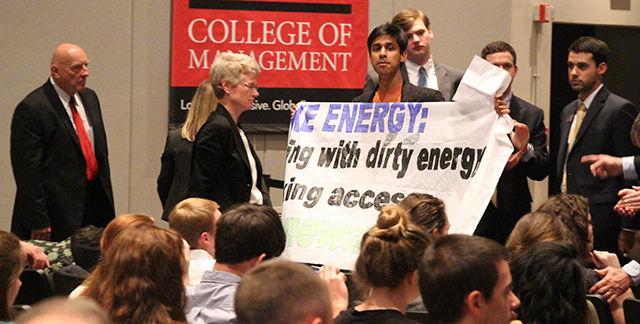More than 20 student protesters interrupted Duke Energy’s CEO Lynn Good’s lecture in Nelson Hall Wednesday evening to denounce the company’s blockage of the Energy Freedom Act.
Halfway through the event, about 20 protesters stood up out of their seats, held up a sign that read “Duke Energy leading with dirty energy” and broke into chant, beginning by shouting “mic check.”
Unaffiliated audience members stood and clapped to drown out the chanting protesters as both students and faculty members ushered them out of the building.
The Energy Freedom Act would open up North Carolina energy markets to the third-party sale of electricity. The bill would also allow renewable-energy companies to build solar or wind-power systems on customer’s own property and bill customers directly for the electricity, even though they aren’t utilities.
Several businesses, including Wal-Mart, Cargill, Target, Lowes and Family Dollar have expressed support for the legislation and wrote to the bill’s author, Rep. John Szoka (R-Cumberland), the bill’s author, asking him to introduce it.
Duke Energy, a utilities company, has since opposed the bill and has set up a lobbying team to stop the bill from passing.
Ishan Raval, a senior studying English and philosophy, organized the protest along with Soumya Nadabar, a junior studying international studies and economics and Hannah Frank, a sophomore studying interdisciplinary studies.
“They claim to be leading in energy, but the reality is that they are blocking attempts to bring in renewable energy,” Frank said.
The speech resumed when all protesters were off the premises. Good attributed the protesters’ presence to their desire to protect the environment.
“I think these are students who are passionate about the environment,” Good said. “I respect passion about the environment,” Good said.
During the demonstration, protesters handed out pamphlets that appeared to be flyers for the event but when opened contained information that condemned Duke Energy’s attempts to block House Bill 245, the Energy Freedom Act.
Administrators at the Poole College of Management said the protesters did not file a petition that would have allowed them to protest outside of the event.
“The actions that happened today were totally against university policy, and there could be actions taken against the students who participated in the protest,” said Ira Weiss, dean of the Poole College of Management.
University Police Chief Jack Moorman said it is up to the organizers of an event whether or not to allow protests.
Student Ambassadors from the Poole College of Management intervened during the chanting by taking the pamphlets that the protestors were reading from.
“Our initial reaction was, if they don’t have their chant papers, they can’t do the chants,” said Hamilton James, a junior in accounting and one of the student ambassadors that tried to handle the situation.
James said the ambassadors were surprised and upset about the demonstration, calling it disrespectful to the event and to Good.
“I guess it was just so unexpected that you didn’t think much about it, that you get up and do something to get them out,” James said. “It wasn’t the right place to do a protest.”
As protesters gathered to take a celebratory picture outside of Nelson Hall, campus police came and collected names and student ID numbers. Protesters were then asked to vacate the premises.
Moorman said this was done so that those same protestors would not enter the event again after being asked to leave. After protesters had offered up their IDs, Raval told Campus Police he organized the protest.
Raval said the purpose of the protest was to show legislators that students were ready to fight for the future of the environment.
The lecture was part of the Wells’ Fargo Executive Series Lecture. Chancellor Randy Woodson was among the event’s more than 300 attendees.
Good came to NC State to talk about leadership and innovation. During the presentation, discussed Duke Energy’s involvement in taking responsibility with cleaning up the Dan River coal ash spill and researching clean energy.
“We have been studying wind and solar power since 2007,” Good said. “We have invested 4 billion dollars in renewable energy.”
During the conclusion of speaker events, students have an opportunity to voice opinions and ask questions. Weiss said the protesters should have waited until this portion to voice their dissent.
“They would have had all the right to ask questions at the end, they could have challenged Ms. Good with the actions associated with Dan River, but they didn’t take that route,” Weiss said.
After the event, Good commented on her reaction to what happened.
“They had a banner and they were chanting, and I knew immediately what was happening,” Good said. “I waited for that to finish, I thought it was important for me to acknowledge that and did so after they left. It was the first time someone interrupted me while I was speaking.”
Editor’s Note: Soumya Nadabar is a junior studying economics and international studies and not a senior in management as previously reported.








